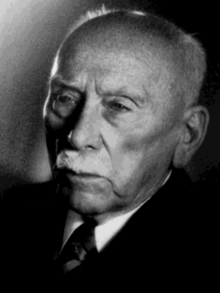Jules Bordet
Jules Jean Baptiste Vincent Bordet (born June 13, 1870 in Soignies , Belgium , † April 6, 1961 in Brussels , Belgium) was a Belgian medic ; he specialized in immunology and bacteriology . For his discoveries in the field of immunity, he received the Nobel Prize in Medicine in 1919 . The Bordetella pertussis bacterium is named after him.
Life
Bordet was the son of a teacher, enrolled at the University of Brussels at the age of 16, earned his doctorate in medicine in 1892 and began his work at the Pasteur Institute in Paris in 1894 . There he described the phagocytosis of bacteria by white blood cells in Elia Metschnikoff's laboratory . In 1898 he explained the hemolysis caused by the addition of foreign blood serum . From 1901 he worked at the Pasteur Institute near Brussels .
In 1899 he married Marthe Levoz. The marriage resulted in a son and two daughters.
In 1900 he left Paris to set up the Pasteur Institute in Brussels and found that non-specific serum components in vivo enhance the initial specific antigen-antibody response and convert it into a more effective defense mechanism. He called these components Alexine . Today they are known as the complement system. The process of binding antigen, on the one hand, and complement products, on the other hand, thus discovered became the basis of complement binding reaction laboratory tests (KBR tests) . This made serological tests for syphilis possible. In particular, August von Wassermann developed the test named after him. The same (KBR) techniques are used to diagnose countless other diseases today. With his brother-in-law Octave Gengou , he isolated Bordetella pertussis in pure culture in 1906 and postulated it as the cause of whooping cough .
In 1907 he became professor of bacteriology at the Université Libre de Bruxelles . In 1940 he retired, his son Paul Bordet succeeded him at the Pasteur Institute .
Bordet was a Freemason and a member of the Masonic Lodge Les Amis Philanthropes No. 2 in Brussels.
Awards
He received the Nobel Prize in Medicine in 1919 for his discoveries in the field of immunology . Bordet received honorary doctorates from the Universities of Cambridge , Paris , Strasbourg , Toulouse , Edinburgh , Nancy , Québec , Fall, Montpellier , Cairo and Athens . He was also a member of the Royal Society , the Royal Society of Edinburgh , the Académie nationale de Médecine (Paris), the Académie des sciences , the National Academy of Sciences ( USA ) and the German Academy of Sciences Leopoldina .
The asteroid (9447) Julesbordet is named after him.
literature
- Werner Köhler : Bordet, Jules Jean-Baptiste Vincent. In: Werner E. Gerabek , Bernhard D. Haage, Gundolf Keil , Wolfgang Wegner (eds.): Enzyklopädie Medizingeschichte. Walter de Gruyter, Berlin and New York 2005, ISBN 3-11-015714-4 , p. 200.
Web links
- Information from the Nobel Foundation on the awarding of the 1919 prize to Jules Bordet
- Biography (german)
- Biography on faqs.org (English)
Individual evidence
- ^ Documents submitted to Les Prix Nobel
- ↑ See also Bernard Zalc: Some comments on Fleck's Interpretation of the Bordet-Wassermann Reaction in view of present biochemical knowledge. In: Robert S. Cohen, Thomas Schnelle (Ed.): Cognition and Fact. Materials on Ludwik Fleck. Dordrecht 1986, pp. 399-406.
- ↑ Eugen Lennhoff, Oskar Posner, Dieter A. Binder: Internationales Freemaurer Lexikon . 5th edition 2006, Herbig Verlag, ISBN 978-3-7766-2478-6 , p. 146
- ^ Entry on Bordet, Jules Jean Baptiste Vincent (1870 - 1961) in the Archives of the Royal Society , London
- ^ Biographical Index: Former RSE Fellows 1783–2002. Royal Society of Edinburgh, accessed October 10, 2019 .
- ↑ Jules Bordet's membership entry at the German Academy of Natural Scientists Leopoldina , accessed on October 12, 2012.
| personal data | |
|---|---|
| SURNAME | Bordet, Jules |
| ALTERNATIVE NAMES | Bordet, Jules Jean Baptiste Vincent (full name) |
| BRIEF DESCRIPTION | Belgian biologist and immunologist |
| DATE OF BIRTH | June 13, 1870 |
| PLACE OF BIRTH | Soignies |
| DATE OF DEATH | April 6, 1961 |
| Place of death | Brussels |
